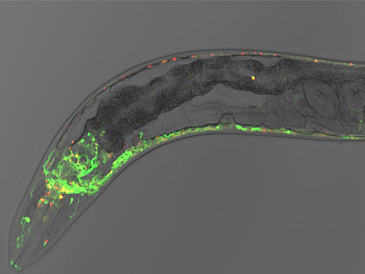Proteins are vital for survival and perform a variety of tasks in every cell. They catalyze reactions, transport substances, form the cytoskeleton, and enable movements such as muscle contractions. There are proteins in our cells that are very short-lived and only active for minutes or a few hours, while others are active for months or even years. Why is this so – and what factors regulate the life span of a protein? And what influence does the age of the organism or cell have on the life span of the protein and vice versa?
In order to answer these questions, Professor Janine Kirstein from the University of Bremen and Dr. Tim Clausen from the Institute of Molecular Pathology (IMP) in Vienna want to study the life span – namely, synthesis, folding, activity, and finally the breakdown – of the muscle protein myosin in the nematode Caenorhabditis elegans.
Why the Protein Myosin?
In contrast to other pathological proteins, the researchers say little is known about the aging process of the physiological proteins such as myosin: “Protein folding has already been extensively analyzed for aggregation-sensitive prone and toxic proteins that can cause diseases such as Alzheimer’s. However, we know very little about how the life span of proteins that perform physiological tasks in our bodies is regulated,” explains Professor Kirstein. “Nevertheless, over 1,000 mutations in myosin are known to cause defects in functionality and thus diseases.”
Because of its characteristics, the nematode is suitable for the joint project “Pro-Watch: Analysis of Protein Life Span in Aging Nematodes.” “The nematode is transparent and allows the synthesis, folding, activity, and degradation of myosin in living animals to be examined using fluorescence sensors. The worm is short-lived with about 25 days. Its life is a time-lapse process, so to speak, allowing us to see the development, the adult phase, the aging process, and finally the death of the organism within a month.”
Kirstein and Clausen plan to develop a fluorescence-based sensor that, for the first time, enables simultaneous measurement of the most important parameters of the protein life span of myosin. The findings can be transferred to other proteins in order to gain a basic understanding of the interplay between protein aging and the aging of the whole organism.
About the Allen Distinguished Investigator Program
The Allen Distinguished Investigator program was established in 2010 by the late Microsoft co-founder and philanthropist Paul G. Allen to support creative, early-stage research projects in biology and medical research. A total of 130 Allen Distinguished Investigators have been appointed over the past 12 years. Each award covers three years of research funding.
Further Information:
Pro-Watch: An Approach to Monitor Protein Life Span in Aging Worms / Pro-Watch: Analysis of Protein Life Span in Aging Nematodes:
https://alleninstitute.org/what-we-do/frontiers-group/distinguished-investigators/investigators/
https://www.uni-bremen.de/en/zellbiologie
Contact:
Professor Janine Kirstein
University of Bremen
Biology/Chemistry
Tel.: +49 421 218-62880
Email: kirsteinprotect me ?!uni-bremenprotect me ?!.de

